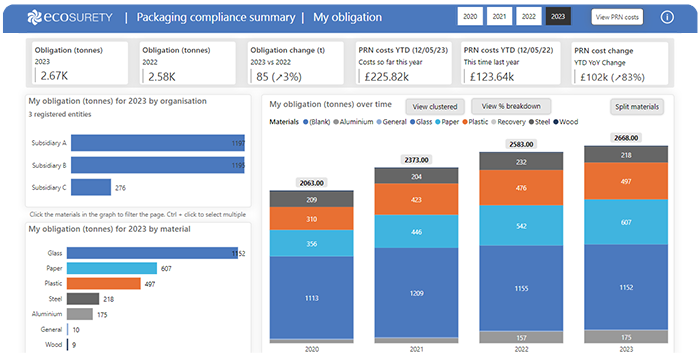Introduction
The new Extended Producer Responsibility (EPR) for packaging regulations impact all UK organisations from 2023 that handle or supply packaging. If that describes your organisation, you must check if you have any obligations. This article explains how.
If you have not done so already, please see this article and video to understand what packaging EPR is.
EPR obligation criteria
To find out if the new packaging EPR regulations apply to your organisation, you must check if ALL of the following criteria apply to your organisation:
You’re an individual business, subsidiary or group (but not a charity)
AND your annual turnover is £1 million or more (based on your most recent annual accounts)
AND you were responsible for more than 25 tonnes of packaging in the previous calendar year
AND you carry out any of the specified packaging activities listed by government
Important to know
All packaging supplied through the UK market or imported, emptied and then discarded in the UK, counts towards the 25 tonne threshold.
Packaging activities
For the last point, government have provided six packaging activities, and you may need to act if you do any of the following:
Supply packaged goods to the UK market under your own brand - This includes selling packaged goods labelled with your own brand. A brand includes a logo, trademark, or any distinctive mark. It is important to note that the legal owner of the trademark, as listed on the gov.uk registered trademark register, will be classed as the brand owner of the packaging and will pick up the obligation. You may also need to take action if you pay another company to produce or pack goods sold under your brand name, place your branded goods on the UK market or import goods for you.
Place goods into packaging that’s unbranded when it’s supplied - This includes placing goods into packaging that is unbranded when it is supplied, for your own or another organisation. For packaging placed on the market in 2024 onwards, this also includes branded packaging where the brand-owner is not established in the UK, or is classed as a small organisation.
Import products in packaging - This applies if you import products from outside the UK that are in packaging, and you go on to supply these products to the UK market - even if you discard the packaging before selling the goods. This activity does not apply if you import filled, branded packaging on behalf of a UK-based brand-owner or you import filled, unbranded packaging that you supply to an organisation classed as large under packaging EPR that applies its own brand before supplying it on.
Own an online marketplace - This applies if you operate a website or app that allows non-UK organisations to sell their goods into the UK. Selling goods from UK organisations only on an online marketplace does not meet this definition and you should check if other activities apply to your organisation.
Hire or loan out reusable packaging - For example, hiring out or loaning reusable pallets or reusable food containers to other organisations in the UK.
Sell empty packaging - For example, if you manufacture or import empty, unbranded packaging and then supply it to a business that is not classed as a large organisation under packaging EPR, as they have an annual turnover under £2m and handle and supply less than 50 tonnes of packaging a year. This also applies if you sell empty, unbranded packaging to a large producer who in turn supplies it unfilled.
Sell filled packaging to an end user - If you sell filled packaging to a business or consumer end user but do not complete one of the other six activities on it, this packaging does not need to be reported under the main EPR data submission and won’t attract any compliance costs. This activity relates to a separate ‘nation of sale’ data collection and reporting requirement. However, packaging supplied under this function is included when assessing whether a business meets the packaging handled thresholds described above, but should only be accounted for once if another packaging function applies.
Under EPR a single organisation takes on 100% of the responsibility for any given piece of packaging, including reporting and financial obligations (although a different organisation could pick up a nation data reporting obligation if they sell it directly to consumers).
The listed activities illustrate that this single point of compliance will usually rest with the brand owner or importer of the packaging.
Important to know
Online marketplaces selling packaged goods or empty packaging from outside of the UK are obligated for the first time under packaging EPR - they were not included in the previous packaging producer responsibility regulations.
Packaging definition
When considering the thresholds and packaging activities, be aware that government have defined packaging as:
"Any material that is used to cover or protect goods that are sold to consumers. It makes handling and delivering goods easier and safer. It also includes anything that's designed to be filled at the point of sale, such as a coffee cup. Packaging also makes goods look appealing and it may display a company's logo or brand. 'Goods' could include raw materials or manufactured items."
De minimis threshold
If your organisation does NOT meet ALL four of the main criteria (including at least one of the six packaging activities), then you fall under the de minimis threshold and have no packaging EPR obligations, apart from mandatory labelling requirements that will apply to all packaging.
If this is the case, we strongly recommend that you continue to check if you ever become obligated in the future, due to a change in your sales, turnover or packaging activities.
Charities are exempt under the EPR regulations. Charities are organisations within the meaning of section 1(1) of the Charities Act 2011 or for the purposes of section 202 of the Corporation Tax Act 2010. Under EPR, they are treated as being below the de minimis, so other businesses in their packaging supply chain will be obligated instead.
Important to know
Even if your organisation does not have an obligation under packaging EPR, you may be asked to provide data and information on your packaging by another organisation that is obligated. This is because the liability and reporting requirements effectively move up the packaging supply chain for businesses that fall under the de minimis.
Groups and subsidiaries
Groups of companies have a choice to either register and comply individually or as a parent company on behalf of the whole or part of the group.
Groups are defined in the regulations as a holding company and one or more subsidiaries. If the holding company and one or more subsidiaries are defined as producers in the regulations, and the aggregate turnovers and packaging handled figures meet the small or large producer thresholds, each company within the group will be classed as an obligated producer.
If the combined group packaging handled and turnover exceeds the large producer thresholds, all of the companies handling packaging are obligated as a large producer. Equally, if the group only exceeds the small producer threshold then all of the companies will be defined as small producers.
If some of your subsidiaries do not meet the turnover and tonnage requirements in their own right, but do meet the requirements when combined, you should register as a parent company for that part of your group.
A holding company and subsidiaries must all be established in the UK to have a group account. This does not necessarily mean the holding company must be a UK registered company.
Guidance about how franchise businesses are obligated under packaging EPR can be found here.
Nation data criteria
You should also check if a separate nation data requirement applies to your organisation, to supply data about which nation in the UK your packaging is supplied to.
If your organisation has a packaging EPR obligation, you will also need to submit nation data if you:
supply filled or empty packaging directly to customers in the UK, where they are the end user of the packaging
supply empty packaging to UK organisations that are either not legally obligated, or are classed as a small organisation
hire or loan out reusable packaging
own an online marketplace where organisations that are based outside the UK sell their empty packaging and packaged goods to UK consumers
import packaged goods into the UK for your own use and discard the packaging
gov.uk EPR obligation checker
Government have provided an online tool to check if you have any packaging EPR data obligations. To visit the gov.uk checker please click here.
Next steps
If you DO meet all of the main criteria, then you will have an obligation and actions that you must legally complete under the new EPR regulations.
Next you must determine if you are classed as a small or large organisation under EPR for packaging, as this will determine your reporting and financial obligations, and the deadlines for you to complete any required actions.
Each organisation type has its own threshold criteria for you to check, which we explain in the article Identify if your organisation is classed as small or large.
External references
gov.uk EPR obligation checker tool
Read the official packaging EPR guidance on gov.uk
Page updates
25 April 2024 - We updated the 'Sell empty packaging' section to clarify that this activity also applies if you sell empty, unbranded packaging to a large producer who in turn supplies it unfilled.
04 April 2024 - We added:
Clarification in the 'Packaging activities' section about placing goods into packaging that's unbranded when it's supplied, from 2024 onwards.
A new 7th category under 'Packaging activites' for 'Sell filled packaging to an end user'
Clarification of the expemption for charites in the 'De minimis threshold' section
Clarification in the 'Groups and subsidiaries' section about the registration options for groups of companies

Ben Luger
Marketing Project Specialist
Ben helps drive marketing communications and projects for Ecosurety, including project managing the launch of the Ecosurety Exploration Fund and website content development.



